Travelers 2013 Annual Report Download - page 54
Download and view the complete annual report
Please find page 54 of the 2013 Travelers annual report below. You can navigate through the pages in the report by either clicking on the pages listed below, or by using the keyword search tool below to find specific information within the annual report.-
 1
1 -
 2
2 -
 3
3 -
 4
4 -
 5
5 -
 6
6 -
 7
7 -
 8
8 -
 9
9 -
 10
10 -
 11
11 -
 12
12 -
 13
13 -
 14
14 -
 15
15 -
 16
16 -
 17
17 -
 18
18 -
 19
19 -
 20
20 -
 21
21 -
 22
22 -
 23
23 -
 24
24 -
 25
25 -
 26
26 -
 27
27 -
 28
28 -
 29
29 -
 30
30 -
 31
31 -
 32
32 -
 33
33 -
 34
34 -
 35
35 -
 36
36 -
 37
37 -
 38
38 -
 39
39 -
 40
40 -
 41
41 -
 42
42 -
 43
43 -
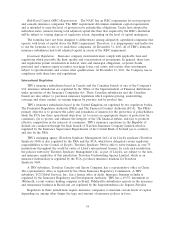 44
44 -
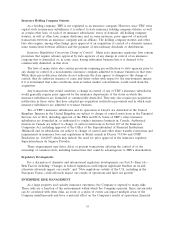 45
45 -
 46
46 -
 47
47 -
 48
48 -
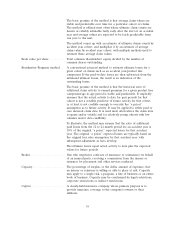 49
49 -
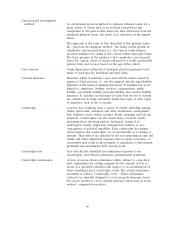 50
50 -
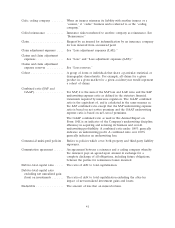 51
51 -
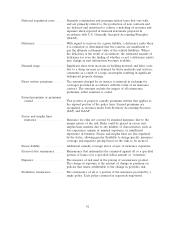 52
52 -
 53
53 -
 54
54 -
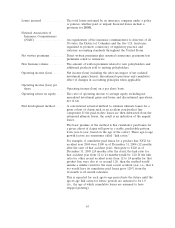 55
55 -
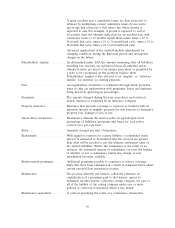 56
56 -
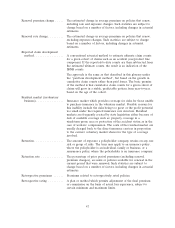 57
57 -
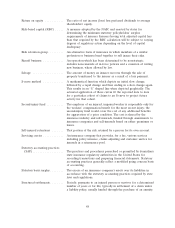 58
58 -
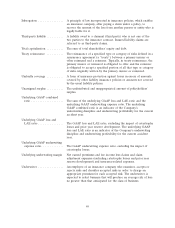 59
59 -
 60
60 -
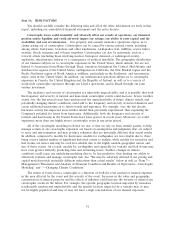 61
61 -
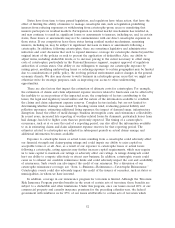 62
62 -
 63
63 -
 64
64 -
 65
65 -
 66
66 -
 67
67 -
 68
68 -
 69
69 -
 70
70 -
 71
71 -
 72
72 -
 73
73 -
 74
74 -
 75
75 -
 76
76 -
 77
77 -
 78
78 -
 79
79 -
 80
80 -
 81
81 -
 82
82 -
 83
83 -
 84
84 -
 85
85 -
 86
86 -
 87
87 -
 88
88 -
 89
89 -
 90
90 -
 91
91 -
 92
92 -
 93
93 -
 94
94 -
 95
95 -
 96
96 -
 97
97 -
 98
98 -
 99
99 -
 100
100 -
 101
101 -
 102
102 -
 103
103 -
 104
104 -
 105
105 -
 106
106 -
 107
107 -
 108
108 -
 109
109 -
 110
110 -
 111
111 -
 112
112 -
 113
113 -
 114
114 -
 115
115 -
 116
116 -
 117
117 -
 118
118 -
 119
119 -
 120
120 -
 121
121 -
 122
122 -
 123
123 -
 124
124 -
 125
125 -
 126
126 -
 127
127 -
 128
128 -
 129
129 -
 130
130 -
 131
131 -
 132
132 -
 133
133 -
 134
134 -
 135
135 -
 136
136 -
 137
137 -
 138
138 -
 139
139 -
 140
140 -
 141
141 -
 142
142 -
 143
143 -
 144
144 -
 145
145 -
 146
146 -
 147
147 -
 148
148 -
 149
149 -
 150
150 -
 151
151 -
 152
152 -
 153
153 -
 154
154 -
 155
155 -
 156
156 -
 157
157 -
 158
158 -
 159
159 -
 160
160 -
 161
161 -
 162
162 -
 163
163 -
 164
164 -
 165
165 -
 166
166 -
 167
167 -
 168
168 -
 169
169 -
 170
170 -
 171
171 -
 172
172 -
 173
173 -
 174
174 -
 175
175 -
 176
176 -
 177
177 -
 178
178 -
 179
179 -
 180
180 -
 181
181 -
 182
182 -
 183
183 -
 184
184 -
 185
185 -
 186
186 -
 187
187 -
 188
188 -
 189
189 -
 190
190 -
 191
191 -
 192
192 -
 193
193 -
 194
194 -
 195
195 -
 196
196 -
 197
197 -
 198
198 -
 199
199 -
 200
200 -
 201
201 -
 202
202 -
 203
203 -
 204
204 -
 205
205 -
 206
206 -
 207
207 -
 208
208 -
 209
209 -
 210
210 -
 211
211 -
 212
212 -
 213
213 -
 214
214 -
 215
215 -
 216
216 -
 217
217 -
 218
218 -
 219
219 -
 220
220 -
 221
221 -
 222
222 -
 223
223 -
 224
224 -
 225
225 -
 226
226 -
 227
227 -
 228
228 -
 229
229 -
 230
230 -
 231
231 -
 232
232 -
 233
233 -
 234
234 -
 235
235 -
 236
236 -
 237
237 -
 238
238 -
 239
239 -
 240
240 -
 241
241 -
 242
242 -
 243
243 -
 244
244 -
 245
245 -
 246
246 -
 247
247 -
 248
248 -
 249
249 -
 250
250 -
 251
251 -
 252
252 -
 253
253 -
 254
254 -
 255
255 -
 256
256 -
 257
257 -
 258
258 -
 259
259 -
 260
260 -
 261
261 -
 262
262 -
 263
263 -
 264
264 -
 265
265 -
 266
266 -
 267
267 -
 268
268 -
 269
269 -
 270
270 -
 271
271 -
 272
272 -
 273
273 -
 274
274 -
 275
275 -
 276
276 -
 277
277 -
 278
278 -
 279
279 -
 280
280 -
 281
281 -
 282
282 -
 283
283 -
 284
284 -
 285
285 -
 286
286 -
 287
287 -
 288
288 -
 289
289 -
 290
290 -
 291
291 -
 292
292 -
 293
293 -
 294
294 -
 295
295 -
 296
296 -
 297
297 -
 298
298 -
 299
299 -
 300
300 -
 301
301 -
 302
302 -
 303
303 -
 304
304
 |
 |
Inland marine .............. A broad type of insurance generally covering articles that may be
transported from one place to another, as well as bridges, tunnels
and other instrumentalities of transportation. It includes goods in
transit, generally other than transoceanic, and may include policies
for movable objects such as personal effects, personal property,
jewelry, furs, fine art and others.
IRIS ratios ................ Financial ratios calculated by the NAIC to assist state insurance
departments in monitoring the financial condition of insurance
companies.
Large deductible policy ....... An insurance policy where the customer assumes at least $25,000 or
more of each loss. Typically, the insurer is responsible for paying
the entire loss under those policies and then seeks reimbursement
from the insured for the deductible amount.
Lloyd’s ................... An insurance marketplace based in London, England, where
brokers, representing clients with insurable risks, deal with Lloyd’s
underwriters, who represent investors. The investors are grouped
together into syndicates that provide capital to insure the risks.
Loss..................... An occurrence that is the basis for submission and/or payment of a
claim. Losses may be covered, limited or excluded from coverage,
depending on the terms of the policy.
Loss adjustment expenses
(LAE) ................. The expenses of settling claims, including legal and other fees and
the portion of general expenses allocated to claim settlement costs.
Loss and LAE ratio (SAP and
GAAP)................. For SAP, it is the ratio of incurred losses and loss adjustment
expenses less certain administrative services fee income to net
earned premiums as defined in the statutory financial statements
required by insurance regulators. The GAAP ratio is calculated in
the same manner as the SAP ratio.
The GAAP loss and LAE ratio as used in this Annual Report on
Form 10-K is an indicator of the Company’s underwriting discipline
and underwriting profitability.
Loss reserves .............. Liabilities established by insurers and reinsurers to reflect the
estimated cost of claims incurred that the insurer or reinsurer will
ultimately be required to pay in respect of insurance or reinsurance
it has written. Reserves are established for losses and for LAE, and
consist of case reserves and IBNR reserves. As the term is used in
this document, ‘‘loss reserves’’ is meant to include reserves for both
losses and LAE.
Loss reserve development ..... The increase or decrease in incurred claims and claim adjustment
expenses as a result of the re-estimation of claims and claim
adjustment expense reserves at successive valuation dates for a
given group of claims. Loss reserve development may be related to
prior year or current year development.
44
